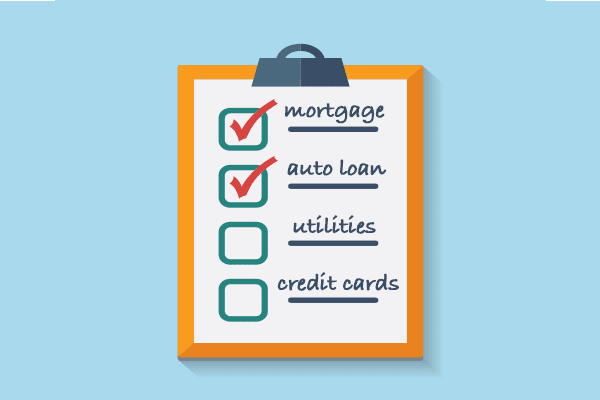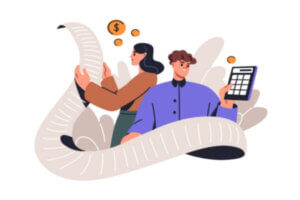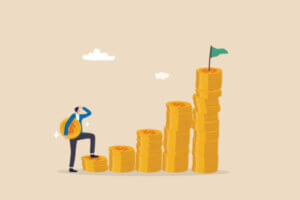Facing a mound of piling debts each month is an exhausting process. You may be tempted to throw chunks of your paycheck at your auto loan one month and then feel an urge to peel away a layer or two of your student loans the next.
Or, you may be paralyzed by the staggering amount of open accounts on your credit report and decide it is better to do nothing. Maybe, just maybe, if you’re quiet enough for long enough, your creditors will just forget about you and you can ride out the statute of limitations.
That would be an interesting strategy, but it’s a dead-end street. We don’t recommend it.
Instead, you should pay off your debts while keeping in mind how certain loans will actually benefit you, while others will only drain your energy and strain your bank account.
When you repay debt strategically, it does not have to be a game of Russian Roulette. On the contrary, it can be more like a nice, slow game of chess where you eliminate pieces of debt one-by-one … until you’re victorious.
How to Prioritize Debt
There are certain loans that the government actually wants people to take out, things like mortgages and student loans. When people buy a house or go to college, it means more homeowners and a more educated population. This is good for the economy and the nation. That’s why the government is willing to offer tax breaks on these loans. And that’s why these are loans you may want to take your time paying back.
Some people like to refer to this as “good debt,” while others think there is no such thing as “good debt.” To keep things simple, we’ll just say (barring abnormally high interest rates) mortgages and student loans are lower priority debts. In other words, it’s OK to take a decade or longer to repay these debts, especially if you have other more pressing or bank-draining debts on the horizon.
That being said, there is no one size fits all prescription for getting out of debt. There are, however, factors every consumer must consider when weighing the pros and cons of repaying certain debts before others.
Here are some things to consider when prioritizing which debts to pay off first.
Tax Breaks
Tax breaks can come in the form of credits, reductions or exemptions. Certain loans, like mortgages and student loans, are tax deductible and allow you to reduce your taxable income.
For student loans, you can deduct up to $2,500 in interest paid. For mortgages, you can deduct all of the interest on a loan worth up to $750,000.
Interest Rates
Certain loans almost always will have higher interest rates than others. Student loans and mortgages have average interest rates of 3%-7.5%.
Good luck finding a credit card with single digit interest rates; even with a perfect credit score, consumers would be hard pressed to find a credit card with a lower interest rate than 14%. The average credit card interest rate is actually a bit higher at 19% in 2019.
Personal loans have the most volatile interest rates, fluctuating from as low as 5% to as high as 36%, sometimes higher.
If, however, your loan comes attached with an interest rate above 36%, this may be a sign you’re dealing with a predatory lender. If this is the case, the Truth in Lending Act (TILA) outlines your rights as a borrower. One of your rights is the right of recession, which lets you turn down a loan up to three days after signing the paperwork.
Remaining Balance
Unless you win the lottery, you’re not going to repay your mortgage in a year. You can, however, repay that $500 medical bill, or that $1,200 high-interest credit card. Repaying smaller debts can fill you with a sense of accomplishment, providing the momentum needed to endure (and eventually take down) the larger ones.
Consequences of Default
The loans with the direst consequences of default should be higher on your to-do list. Missing enough mortgage payments will land you on the street. Dodging child support payments or evading taxes could land you behind bars.
There are no good consequences of default, so this part can feel like choosing between the lesser of two evils. Still, anybody can overcome a bad credit report or bounce back from bankruptcy. It’s a lot harder to regain financial stability without a roof over your head.
Strategies to Pay Off Debt
There are two popular schools of thought when it comes to paying off debt. One is the debt avalanche method, which targets high interest debts first. The other is the debt snowball method, which eliminates smaller debts (regardless of interest rate) before gearing up to take down the larger ones.
Debt Avalanche
With the debt avalanche method, you repay your debts with the highest interest rates first, regardless of the remaining balances. This is a logically sound approach as it will always save you the most money. The challenge is having enough patience to chip away at high loan balances that may take years to repay. However, those with enough gumption to stick with it will benefit the most financially.
Debt Snowball
The debt snowball method prioritizes the loans with the lowest balances, regardless of interest. This works by giving you enough momentum to eventually take down the high rate, high balance loans that fall in at the end of the list.
What Bills to Pay First When Money Is Tight
Deciding what bills to pay first is not the same as deciding which bills to pay off first. When you take out a mortgage, you’re in it for the long haul, but that doesn’t mean you’re free to skip payments here and there. When deciding what bills to pay when funds are limited, you need to order them by consequences of default. The bills with the direst, most life-shattering consequences of default should be at the top of the list.
- Housing (Mortgage/Rent) – This needs to be your top priority. If you fall behind on your mortgage, the bank can foreclose on your home and then you’re scrambling to put a roof over your head. Missing rent has similar consequences, in that, if you do it enough times, you will be looking for a new place to live. Not to mention, an eviction will tarnish your credit report and deter future landlords from letting you near their property.
- Child Support – You need to pay child support if for no other reason (and there are plenty of other reasons) than that you may end up in jail if you don’t.
- Taxes – The consequences for not paying your taxes on time grow in severity the more time goes by. For example, if you don’t pay your taxes by the April 15 deadline, you will be slapped with a 0.5% late penalty of the amount owed. You will be charged this penalty for every month you don’t pay, up to 25% of the amount you owe. So, if you owe $20,000, and refuse to pay up, you risk being charged up to $5,000 in late penalties. The IRS won’t throw you in jail if you simply don’t have the money to pay them. But they will audit you and if they deem you have the funds, you will be subject to bank levies, wage garnishments and possibility even federal imprisonment.
- Auto Loan – If you don’t pay your car payment, your credit score will plummet and you risk losing your car. If you’re unable to make your car payments, it may be time to call up your lender or look into downgrading to something more affordable.
- Credit cards – Skipping credit card payments can damage your credit score and even result in higher interest rates, which will make it that much harder to get your debt under control.
- Personal Loans – Skipping your personal loan payments have similar consequences to skipping your credit cards payments. They are both forms of unsecured debt. This means they can’t take away anything as precious as your home or car, but they can wreak havoc on your credit score and make it harder to get a loan in the future.
- Student Loans –Federal student loans give you some options when the budget is tight. Unlike credit cards or personal loans, student loans can be put into forbearance or deferment, which can give you some time to work out a strategy if you are really struggling to stay afloat.
- Collections – Collections should not be ignored; unpaid collections will tarnish your credit report and repel future lenders. That being said, you’ve already let it get this far. You may be better off focusing on your other bills to avoid having multiple debt collectors coming after you. Propel this one a few notches higher if or when the collection agency takes you to court by filing motions to sue.
- Medical bills – Medical debt can result in the same sorts of penalties as other types of debt. Once again, they should not be ignored, but you often have a little more time when dealing with medical debt, as hospitals may take some time waiting for the insurance to kick in before sending your debt to a collection agency. Also, there are no interest payments that would add to your debt load.

8 MINUTE READ
Home » InCharge Blog »
Sources:
- NA. (2019, May 30). Common Penalties for Individuals. Retrieved from: https://www.irs.gov/businesses/small-businesses-self-employed/understanding-penalties-and-interest
- NA. (2019, July 10). Credits and Deductions for Individuals. Retrieved from: https://www.irs.gov/credits-deductions-for-individuals
- NA. (2018). Publication 970 (2018), Tax Benefits for Education. Retrieved from: https://www.irs.gov/publications/p970#en_US_2018_publink1000178230

















